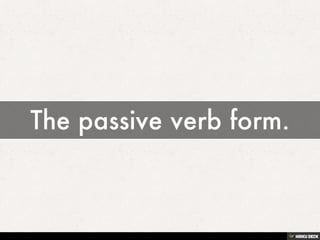
Passive Voice Forms and Examples
- 1. The passive verb form.
- 2. Passive voice is used when the focus is on the action. Example: My bike was stolen.
- 3. Form of Passive Subject + finite form of to be + Past Participle (3rd column of irregular verbs) Example: A letter was written.
- 4. When rewriting active sentences in passive voice, note the following: the object of the active sentence becomes the subject of the passive sentence the finite form of the verb is changed (to be + past participle) the subject of the active sentence becomes the object of the passive sentence (or is dropped)
- 5. Active to pasive voice. Changes.
- 6. Present Simple • Change: am/is/are + past participle • Active: She makes the dinner • Pasive: The dinner is made
- 7. Present continuous • Change: am/is/are+being+past participle • Active: making the dinner • Pasive: the dinner is being made
- 8. Present perfect simple • Change: have/has+been+past participle • Active: She has made the dinner • Pasive: The dinner has been made
- 9. Past Simple • Change: was/were+past participle • Active: She made the dinner • Pasive: The dinner was made
- 10. Past perfect simple • Change: has+been+past participle • Active: She had made the diner • Pasive: The dinner had been made
- 11. Future simple • Change: will+be+past participle • Active: She will make the dinner • Pasive: the dinner will be made •
- 12. Future perfect simple • Change: will+have+been+past participle • Active: she will have made the dinner • Pasive: The dinner will have been made
- 13. Be going to • Change: is/are/am+going to+be+past participle • Active: She is going to make the dinner • Pasive: The dinner is going to be made
- 14. Modals • Change: modal+be+past participle • Active: She can make the dinner • Pasive: The dinner can be made
- 15. The infinitive • Change: to be+ past participle • Active: They want to make dinner • Pasive: They want the dinner to be made
- 16. More examples: • They can buy the house-The house can be bought • He ate all of the cookies-All of the cookies were eaten. • Mark Twain wrote the book-The book was written by Mark Twain. • The housekeeper will clean the room. → The room will be cleaned by the housekeeper. • He is writing a book- A book is being written.